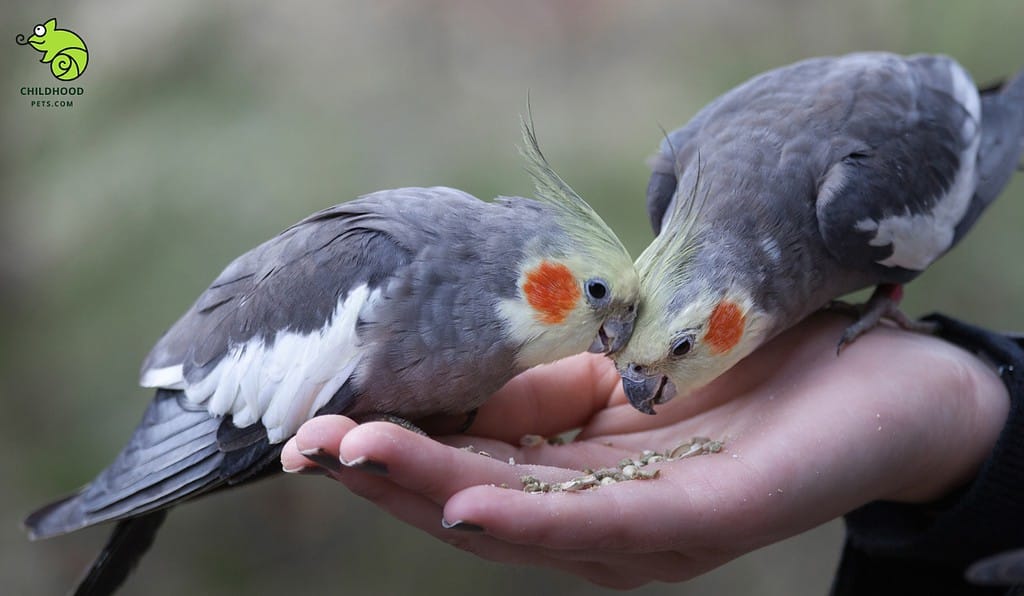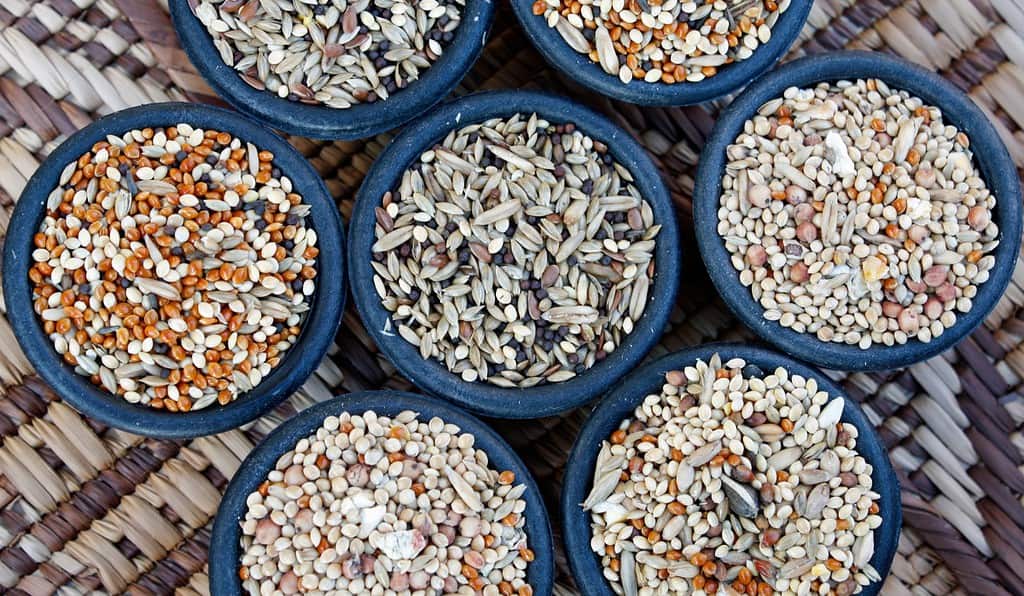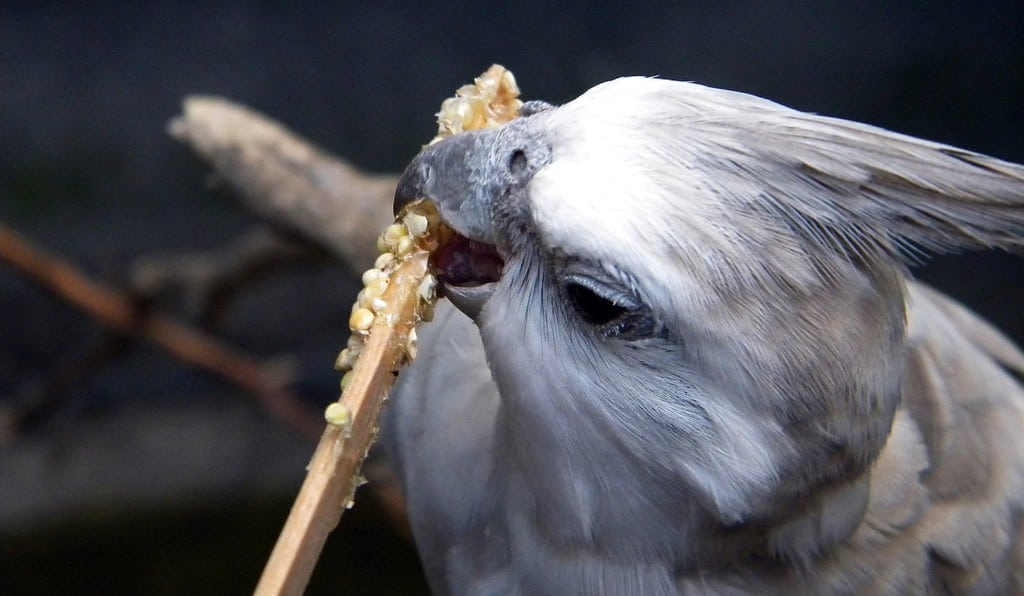
Imagine the soft chirping of a happy cockatiel filling your home. These charming birds, with their vibrant personalities, bring joy and companionship. Yet, the key to their vitality lies in their diet, specifically the seeds they consume. The question of “what seeds can a cockatiel eat” is crucial for every cockatiel owner aiming to ensure the health and happiness of their feathered friend.
As a general rule, cockatiels thrive on a varied diet of seeds, fresh fruits, and vegetables. Ensure a mix of millet, canary seeds, and limited sunflower seeds, complemented by fresh produce and high-quality pellets for optimal health.
Read on to explore a comprehensive vet’s report on the seeds your cockatiel can safely enjoy, those to avoid, and practical tips and recommendations for a balanced, nutritious diet. Let’s embark on this journey to cockatiel well-being together!
🌟 Did You Know? Cockatiels have a lifespan of 15-20 years, and a balanced diet can help them live a long, healthy life!
Understanding Cockatiels’ Dietary Needs
As we flutter into the next section, let’s delve deeper into understanding the dietary needs of cockatiels.
Cockatiel Nutritional Requirements
Cockatiels, like us, have specific nutritional requirements that need to be met for them to thrive. A balanced diet is crucial, ensuring they receive the right amounts of vitamins, minerals, and other essential nutrients. Now, let’s take a glance at how the nutritional needs of cockatiels.
| Nutrient | Cockatiel |
| Protein | 12%-14 % |
| Fat | 4%-5% |
| Carbohydrates | 50% |
| Vitamins | Essential |
| Minerals | Essential |
In my experience guiding bird owners, the number one thing new bird owners ask me is about the right diet for their cockatiels. It’s essential to provide a variety of seeds, such as sunflower seeds, millet, and canary seeds, ensuring they get a mix of nutrients.
In the realm of seeds, not all are created equal. Some seeds are high in fat and should only be given in moderation, while others can be a regular part of their diet. It’s all about balance and variety.
🥦 Tip: Always ensure your cockatiel has access to fresh, clean water alongside a variety of seeds and fresh produce!
Common Dietary Mistakes Cockatiel Owners Make
I’ve seen cockatiel owners inadvertently make dietary mistakes that can impact the health of their beloved pets. Let’s navigate through these common errors and explore solutions to ensure your cockatiel’s dietary needs are met with precision and care.
- Feeding Only Seeds: Seeds are essential, but a diet solely based on them is insufficient.
Solution: Complement seeds with fresh fruits, vegetables, and high-quality pellets.
- Overfeeding Sunflower Seeds: These seeds are high in fat.
Solution: Limit sunflower seeds and balance with other nutritious seeds and foods.
- Neglecting Water Supply: Cockatiels need constant access to fresh, clean water.
Solution: Regularly check and refill your bird’s water dish.
- Ignoring Fresh Foods: Fresh foods provide essential nutrients not found in seeds.
Solution: Integrate fresh fruits and vegetables into your cockatiel’s diet.
- Avoiding Pellets: High-quality pellets can be a valuable part of a cockatiel’s diet.
Solution: Include pellets as part of a varied diet.
9 Safe Seeds for Cockatiels
As we soar further, let’s delve into the world of seeds, understanding which are safe and beneficial for your cockatiel, ensuring they not only survive but thrive.

1. Sunflower Seeds
Sunflower seeds are a favorite among cockatiels, and for a good reason. They are packed with energy, essential fatty acids, and several vitamins and minerals. However, moderation is key. Given their high-fat content, sunflower seeds should only make up a small portion of your cockatiel’s diet. In my experience, a balanced approach, combining sunflower seeds with other seeds and fresh foods, contributes to a healthier, happier cockatiel.
🌻 Did You Know? Sunflower seeds are rich in Vitamin E, which is beneficial for your cockatiel’s skin and feathers!
2. Millet
Millet is a fantastic choice for your cockatiel. It’s not just a treat; it’s packed with valuable nutrients. Millet is rich in proteins, antioxidants, and other essential nutrients that contribute to your cockatiel’s overall well-being. It’s a seed that can be generously included in your bird’s diet, providing both nutrition and enjoyment.
3. Canary Seeds
Canary seeds are not just for canaries! They are a suitable and nutritious addition to your cockatiel’s diet. Low in fat and high in protein, canary seeds are a healthy choice, contributing positively to your cockatiel’s dietary landscape.
4. Pumpkin Seeds
Pumpkin seeds are a nutritious addition to your cockatiel’s diet. They are rich in antioxidants, healthy fats, and other essential nutrients. They can help boost your bird’s immune system and keep their feathers shiny and healthy. However, ensure they are unsalted and given in moderation.
🎃 Tip: Offer pumpkin seeds as a treat, not a regular meal, to keep your cockatiel’s diet balanced.
5. Chia Seeds
Chia seeds are a superfood that can be a beneficial part of your cockatiel’s diet. They are high in omega-3 fatty acids, protein, and various essential minerals. They can support your bird’s overall health, improve their skin and feather condition, and provide them with sustained energy.
6. Oats
Oats are a great source of dietary fiber, which is essential for your cockatiel’s digestive health. They also contain various vitamins and minerals that contribute to the overall well-being of your bird. You can offer cooked oats to your cockatiel as a warm, comforting treat, especially in colder weather.
7. White Millet
White millet is a fantastic seed for cockatiels. It’s packed with protein, essential amino acids, and vitamins, contributing positively to your bird’s diet. It’s a smaller seed, making it easier for cockatiels to eat and digest, and it’s a favorite among many birds for its taste.
8. Quinoa
Quinoa is a highly nutritious seed that is packed with protein and all nine essential amino acids. It’s also rich in magnesium, B vitamins, iron, potassium, calcium, phosphorus, vitamin E, and various beneficial antioxidants. Cooked and cooled quinoa can be a healthy addition to your cockatiel’s diet, providing a boost of nutrition and variety.
When incorporating these seeds and foods into your cockatiel’s diet, always ensure they are prepared without added salts, sugars, or other additives.
Your cockatiel’s health and happiness start with the right nutrition!
9. Safflower Seeds
Navigating into the world of safflower seeds, these are another nutritious option for your cockatiel’s diet Safflower seeds are rich in healthy fats, protein, and fiber, providing a well-rounded nutrient boost to your cockatiel’s diet. They also contain significant amounts of vitamins and minerals, including Vitamin E and magnesium, which are essential for maintaining your bird’s overall health.
Incorporating safflower seeds into your cockatiel’s diet can be a great way to enhance their nutritional intake, ensuring they receive a variety of essential nutrients necessary for optimal health and well-being.
Seeds to Avoid

Navigating the world of seeds can be a bit tricky. While many seeds offer nutritional benefits for cockatiels, some can be harmful. Let’s delve into the seeds you should steer clear of to ensure the safety and health of your feathered friend.
Avocado Seeds
Avocado seeds, along with other parts of the avocado plant, contain persin, a fungicidal toxin. This substance can cause serious health issues in cockatiels, leading to weakness, respiratory distress, and even death. It’s crucial to keep avocados and their seeds away from your bird to ensure their safety and well-being.
Certain Fruit Seeds
Many fruit seeds, including those from apples, cherries, and peaches, contain cyanogenic glycosides, which can release cyanide when ingested. These seeds can cause a range of symptoms from mild discomfort to serious health complications, and in severe cases, can be fatal to cockatiels. It’s always best to remove these seeds before offering fruits to your bird.
Other Harmful Seeds
- Castor Bean Seeds: Contain ricin, highly toxic to cockatiels.
- Cottonseed: Contains gossypol, a toxic compound for birds.
- Tomato Seeds: Can cause adverse reactions in cockatiels.
What Can Cockatiels Eat Other Than Seed?
As we transition from what to avoid, let’s focus on the positive and explore the wholesome alternatives to seeds that can be included in your cockatiel’s diet.
Pellets
Pellets are a fantastic addition to your cockatiel’s diet. They are formulated to provide balanced nutrition, ensuring your bird gets all the essential vitamins and minerals. Including pellets in your cockatiel’s diet can contribute to their overall health, vitality, and longevity.
Fresh Fruits and Vegetables
Incorporating fresh fruits and vegetables into your cockatiel’s diet is essential for providing varied nutrition and keeping your bird healthy and happy. Here are some suitable options:
- Carrots: Rich in beta-carotene and other nutrients.
- Broccoli: Packed with vitamins and minerals.
- Berries: A great source of antioxidants.
- Leafy Greens: Provide essential vitamins and minerals.
- Peppers: High in vitamin C.
Each of these fresh foods brings a burst of nutrition, flavor, and texture to your cockatiel’s diet, contributing to their well-being and satisfaction. Remember to wash all fruits and vegetables thoroughly and consult your vet for appropriate portion sizes and feeding frequency.
🥕 Tip: Carrots are rich in beta-carotene, which is converted into vitamin A in your cockatiel’s body, promoting good vision and a healthy immune system!
Feeding Guidelines
As we continue this enlightening journey, let’s shift our focus to the essential feeding guidelines. Understanding the right portions and frequency is crucial to maintaining the health and happiness of your cockatiel.
Portion Control
Portion control is paramount in ensuring your cockatiel is getting the right amount of nutrition without the risk of obesity. Overfeeding can lead to health issues such as obesity, while underfeeding can result in malnutrition. It’s essential to measure the seeds and other foods you’re providing to ensure your bird is getting just the right amount. Consult your vet to establish the appropriate portion sizes for your specific bird, considering their age, size, and health conditions.
📏 Tip: Consistency is key! Stick to measured portions and a regular feeding schedule for a happy, healthy cockatiel.
Frequency
How often should you feed your cockatiel? Regular and consistent feeding schedules are vital for your bird’s well-being. Here’s a suggested feeding schedule to guide you:
| Time | Food Type |
| Morning (7-8 am) | Seeds and fresh water |
| Midday (12-1 pm) | Fresh fruits or vegetables |
| Evening (5-6 pm) | Seeds, pellets, and fresh water |
This schedule ensures that your cockatiel has a balanced diet throughout the day, keeping them energetic and healthy.
Personal Experiences and Recommendations
I recall a time when a concerned bird owner, Martha, brought in her cockatiel, Sunny. Sunny was lethargic, and his feathers lacked the usual luster. The issue? An unbalanced diet rich in sunflower seeds but lacking in variety and essential nutrients. Together with Martha, we revamped Sunny’s diet, introducing a mix of seeds, fresh fruits, vegetables, and high-quality pellets. The transformation was remarkable. Sunny regained his vitality, and his feathers gleamed with health. This experience, among many others, highlights the profound impact of a balanced diet on a cockatiel’s health and well-being.
Recommendations for a Healthy Cockatiel Diet
You want the best for your cockatiel, and a nutritious, balanced diet is the foundation. Here are some practical tips to ensure your cockatiel thrives:
- Diverse Seed Mix: Include a variety of seeds like millet, canary seeds, and hemp seeds to provide a range of nutrients.
- Limit Sunflower Seeds: Due to their high-fat content, offer sunflower seeds sparingly.
- Incorporate Fresh Foods: Daily servings of fresh fruits and vegetables enhance your cockatiel’s diet with essential vitamins and minerals.
- Include High-Quality Pellets: Pellets offer balanced nutrition, ensuring your cockatiel gets all the necessary nutrients.
- Consult Your Vet: Regular check-ups and consultations with your vet ensure your cockatiel’s dietary needs are met, and adjustments are made as needed.
Frequently Asked Questions
Can cockatiels eat sunflower seeds?
Yes, cockatiels can eat sunflower seeds, but in moderation as they are high in fat.
Are pellets necessary in a cockatiel’s diet?
Yes, high-quality pellets provide balanced nutrition and should be part of your cockatiel’s diet.
Can cockatiels eat avocado seeds?
No, avocado seeds contain persin, a toxin harmful to cockatiels.
What other seeds can cockatiels eat?
Cockatiels can safely enjoy millet, canary seeds, pumpkin seeds, sesame seeds, quinoa, and hemp seeds.
Understanding “what seeds a cockatiel can eat” is paramount for their health and vitality. This comprehensive vet’s report has aimed to shed light on the diverse seeds and foods beneficial for your feathered friend. Remember, the right seeds, balanced with other nutritious foods, contribute significantly to your cockatiel’s health, happiness, and longevity.
Did you find this guide insightful? If you enjoyed the article, don’t hesitate to share it with fellow bird enthusiasts. Let’s ensure our cockatiels flourish with the right nutrition, together!
